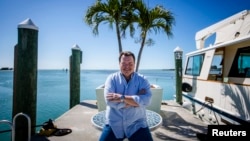Catamaran builder Brian Hall is too young to remember when ferries plied the route between Florida and Cuba in the 1950s, but he has plans to be among the first to revive the once-popular route.
Boosted by President Barack Obama's policy of seeking to normalize relations with the Communist-ruled island after decades of U.S. isolation, Hall hopes to offer a high-speed catamaran service between the Florida Keys and Havana, perhaps as soon as this year.
"My partners and I are ready to start operating as soon as we get the go-ahead," said Hall, 49, president of CubaKat, an offshoot of Fort Lauderdale-based catamaran builder, KonaCat.
He is not alone. At least half a dozen Florida companies are seriously considering ferry ventures, with plans to seek licenses from the U.S. Treasury Department.
The United States and Cuba announced on Dec. 17 their intention to restore diplomatic relations. Last month, the Obama administration made some moves to loosen some travel and trade restrictions.
While charter airlines already run scheduled services to the island, no licenses for ferry service to Cuba have been issued, according to the Treasury Department's Office of Foreign Assets Control (OFAC), which enforces sanctions.
U.S. officials have not commented on the status of requests for ferry licenses. Granma, Cuba's official Communist Party newspaper, published an article on Feb. 11 by two Cuban foreign ministry officials saying Obama could use his executive authority to permit ferry services between the two countries.
Overnight Ferry to Cuba
One company looking at a ferry service is Miami-based United Americas Shipping Services. It is part of a major shipping group with passengers and cargo operations, including Baja Ferries on Mexico's west coast, and Unishipping, a privately-owned, Paris-based company.
United Americas President Joe Hinson said the company has met with officials from south Florida's three main ports in Miami, Tampa and Fort Lauderdale. It plans to offer a 10-hour, overnight service with sleeping cabins and dining facilities.
Another Florida company, Key West Express, already runs a daily ferry service between Fort Myers Beach and Key West, and has expressed interest in extending the route to Havana.
The once-popular ferry service between Florida and Cuba was stopped in the early 1960s when communist Fidel Castro took power.
U.S and Cuban officials are due to hold a second round of talks on Friday in Washington to discuss restoration of diplomatic relations.
Hall is banking on a big increase in travel to Cuba under the policy opening. Last year some 650,000 people visited Cuba from the United States, a figure some experts predict will race past 1 million in the next few years.
He plans for CubaKat to leave from a private marina in Marathon key, about 135 miles (217 km) from Havana, offering a high-speed $338 round-trip ferry service with a capacity for about 190 people, as well as some vehicles.
The ferry routes could compete with existing charter flights which cost $460 round-trip and have high fees for excess baggage.
A former U.S. Air Force C-130 pilot from Atlanta with a catamaran business in Fort Lauderdale, Hall is based in Jacksonville, Florida, where his family also owns two pizza restaurants.
He said he flew his own plane to Havana in January without a Treasury license, risking arrest and fines, to meet Cuban port officials.
"We were met with open arms," Hall said.





